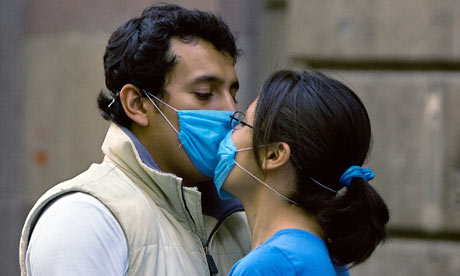Mass swine flu vaccination could begin within weeks
European Commission expected to rubber-stamp regulator's recommendations within days

A couple wearing masks kiss in Mexico City during an outbreak of swine flu. Photograph: Alfredo Estrella/AFP/Getty
Mass vaccination against swine flu could begin within weeks, following the approval of two vaccines by the European regulator today.
One of the two recommended for a licence by the European Medicines Agency (EMEA) is Pandemrix, the vaccine made by British company GlaxoSmithKline (GSK) which is under contract to supply the UK. The other is Focetria, made by the Swiss company Novartis.
The UK has also signed a contract with Baxter, but the EMEA said yesterday that it needed some information about its vaccine, called Celvapan. The agency hopes to be able to approve it next week.
The EMEA's recommendations go to the European Commission, which is expected to rubber-stamp them within days.
The approval follows an expedited procedure which was based mainly on mock-ups of how the vaccines were expected to behave if bird flu rather than swine flu had sparked a pandemic.
But the EMEA says it is satisfied that inserting the new strain into the vaccine "should not substantially affect the safety or level of protection offered".
It has asked manufacturers actively to investigate and monitor any side-effects from the vaccine "so that action can be taken as early as possible if a safety issue emerges". It points out that "as with all medicines, rare adverse reactions may only be detected once the vaccines are used in large numbers of people". The manufacturers have agreed to conduct post-licensing safety studies on 9,000 people for each vaccine.
GSK has said that volunteers suffered only very mild side-effects in trials, including headache, joint pain, muscle pain, pain and redness at the site of the injection, fever and fatigue.
A spokesman for the Department of Health said they planned to start vaccination in October, but were "still dependent on production and delivery of sufficient vaccine to start protecting people". Those most at risk because of their state of health will be prioritised.
Some countries, including China and Hungary, have already approved swine flu vaccines and begun vaccination, but these are variants of existing vaccines and will not protect to the same extent as a vaccine incorporating the pandemic virus strain.
The EMEA is recommending that people should be given two shots, at an interval of three weeks. It says it recognises there is evidence that one dose may be enough, and may change its advice later. The vaccines are approved for use in pregnant women and children over the age of six months.
The clinical trials on which approval was based involved more than 6,000 people for each vaccine, who received a version which was basically the same as the one to be rolled out, but originally contained an avian flu (H5N1) strain – which had been expected to cause a pandemic – instead of H1N1.
"Decades of experience with seasonal influenza vaccines indicate that insertion of a new strain in a vaccine should not substantially affect the safety or level of protection offered," said the EMEA in its statement.
Across the UK, 82 deaths have been linked to the virus, with 70 in England (up three in the last week), nine in Scotland, one in Wales and two in Northern Ireland.
Across England, the number of people being treated in hospital has risen by more than 50%, from 143 last week to 218 this week. Of these, 25 patients are in intensive care.



No comments:
Post a Comment